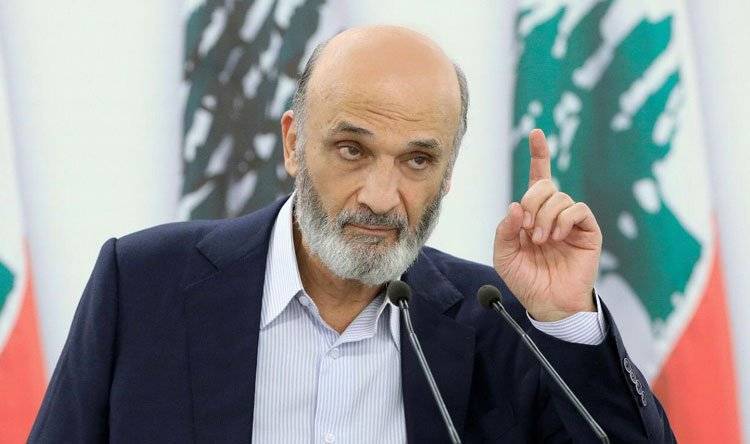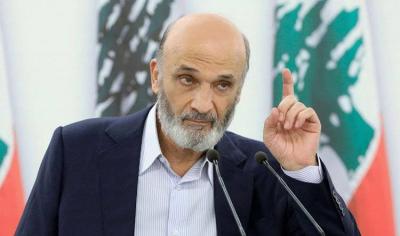The newspaper Asharq Al-Awsat reported a new development in the investigation concerning the events in Tayouneh, which witnessed armed clashes between elements of "Hezbollah" and the "Amal Movement," on one side, and armed individuals from the Ain al-Rummaneh region suspected of belonging to the "Lebanese Forces" party, on the other. This development arose from a surprising decision by the government commissioner to the military court, Judge Fadi Akiki, who indicted the leader of the "Forces," Dr. Samir Jaafar, for "involvement" in the aforementioned events and attributed to him serious criminal offenses, including murder and inciting internal strife. This move angered the "Forces," which held "Hezbollah" fully responsible for the events in Tayouneh, accusing it of "raising tensions on the eve of the parliamentary elections to disrupt them."
More than five months after the Tayouneh incidents, which resulted in the deaths of five individuals from "Hezbollah" and the "Amal Movement," Judge Akiki indicted Jaafar, accusing him of committing "crimes of direct involvement in intentional murder and attempted murder, inciting sectarian strife and promoting discord among Lebanese, internal fighting, endangering civil peace, possessing unlicensed military weapons and using them in armed clashes, undermining state authority and legitimacy, and vandalizing public and private properties." The indictment was referred to Military Investigative Judge Fadi Sawwan, who was requested to interrogate Jaafar and take appropriate action against him.
This procedure had already been set in motion by the military judiciary a week after the events, as Akiki had then instructed Lebanese army intelligence to summon Jaafar to the Ministry of Defense and interrogate him as a suspect in the case. However, Jaafar did not respond to this summons, which was later conveyed to him by posting it on the outer gate of his headquarters in Maarab (Mount Lebanon), and the file was subsequently forwarded to the investigating judge without an indictment.
A judicial source in the military court confirmed to Asharq Al-Awsat that Military Investigative Judge Fadi Sawwan "received the indictment paper against Jaafar and is currently studying it along with the data relied upon by the Military Prosecutor (Akiki) in preparation for setting a date for Jaafar's interrogation in the military court." The source revealed that the indictment "came based on new information that became available, gathered by security agencies in compliance with judicial requests related to this file."
Regarding whether Jaafar's interrogation would take place at his headquarters in Maarab for security reasons, the judicial source familiar with the case reminded that "the law is clear in this regard; the investigating judge interrogates the defendants in his office." He stated: "The law specifies the cases in which the investigating judge can interrogate outside his office, which include the President of the Republic, the Speaker of Parliament, and the Prime Minister, and this exception does not include party leaders."
The timing of the indictment against Jaafar is expected to have political repercussions, with a leader from the "Lebanese Forces" stating that "reviving this case from the standpoint of indicting Dr. Samir Jaafar has a political objective, especially since it comes on the eve of the parliamentary elections." He emphasized to Asharq Al-Awsat that "this action is part of a pattern of provocation that shifts from one file to another, which we see almost daily in Lebanon." The source, who wished to remain anonymous, asserted that "this faction (Hezbollah) seeks to create tensions to disrupt the parliamentary elections, and the Ain al-Rummaneh case is significant, as the main accused in it is Hezbollah."
Jaafar rejected the accusation from his party of causing the deaths of the victims in Tayouneh and responded to his previous summons to be interrogated by army intelligence, stating that he was ready to appear before any judicial or security authority, provided that the officials in "Hezbollah" were subjected to the same investigation as part of a reciprocal treatment. The "Lebanese Forces" party questions the impartiality of Judge Fadi Akiki (son-in-law of Speaker of Parliament Nabih Berri) and his claims in this case, with a leadership member in the "Forces" asserting that "the indictment against Jaafar is illegal, as the defense attorneys for those detained in the Tayouneh events submitted a complaint to the judicial inspection against Judge Fadi Akiki on March 16 in response to multiple violations he committed related to this case, followed by a request to disqualify (retract) Judge Akiki before the civil appeals court in Beirut due to the conflict that arose between the two parties."
He added: "Judge Akiki has evaded being informed of the disqualification request, deliberately remaining at home to avoid receiving the notification of the disqualification request, indicating a deliberate intention not to recuse himself from the file. Contrary to the law, while at home, he indicted Dr. Samir Jaafar for criminal offenses," considering that "the Lebanese Forces see these actions as a systematic destruction of the judiciary and justice, executed by some judges in line with the agendas of certain political parties, specifically (Hezbollah) and (the Free Patriotic Movement), to settle political scores with their opponents."




